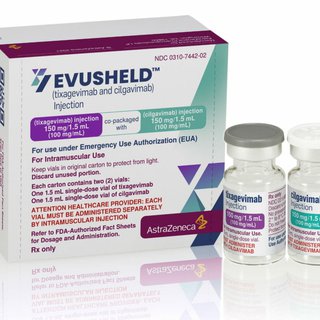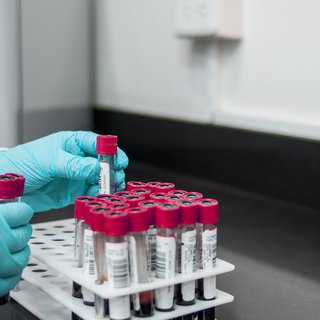Evusheld – is it effective?
Please note: The information on this page is out of date. Evusheld is no longer available in the UK through the NHS or privately, as it was not proven to work against current and future covid variants. Here's a link to our latest information on covid vaccines and treatments.
Updated 1st Nov 2022 to reflect information concerning Evusheld’s effectiveness against autumn/winter 2022-23 variants
What is Evusheld?
Evusheld is made by the pharmaceutical company AstraZeneca and is designed to prevent Covid infections.
Evusheld is already available in countries like the United States, Canada, France, and Israel. It was approved for use in the UK by the Medicines and Healthcare Regulatory Authority (MHRA) in March 2022, but the Government has not yet purchased the drug, and so at the moment people with blood cancer in the UK are unable to get it on the NHS. We have more information about accessing Evusheld privately.
Evusheld was created to treat the original strain of the coronavirus. In this blog, we talk about what research has told us about how effective this treatment is when it comes to the different variants of Omicron, which were not in circulation when Evusheld was tested in clinical trials. We also talk about what the latest research says about how effective it is against the new variants of Omicron that are currently dominant in the UK.
Why are the new variants important?
Back in 2021, there was really strong evidence that Evusheld worked against Covid. This is because scientists did a trial where they gave some people Evusheld and some people a placebo. Those who’d had Evusheld were much less likely to become seriously ill.
But the problem is that as new variants have emerged, it’s been difficult to have up-to-date data on how well Evusheld has continued to work. The variants have been coming and going so quickly that there’s not been time to do a new trial in humans for every new variant.
Just like the Covid vaccines, antibody treatments like Evusheld work by looking for and attaching to a specific part of the virus. However, these parts of the virus often mutate, and these mutations can create new variants. Unfortunately, this sometimes means that antibody treatments like Evusheld aren’t as effective, or aren’t at all effective, against some variants.
What does research on old variants tell us about Evusheld?
To keep up with the changing variants, scientists have been looking at how well Evusheld destroys – or ‘neutralises’ – Covid in lab tests. You can never be sure how accurately these lab results will predict what will happen in the real world, but scientists agree that, while imperfect, the information they give us is better than having no information at all.
As Omicron became dominant just under a year ago, these lab tests showed that Evusheld did not neutralise, or destroy, Omicron as well as it did with previous variants. In the past year, Omicron has changed and split into a large number of different variants. You might have heard of Omicron variants BA.1, or BA.2, for example. Lab tests suggested that Evusheld was a bit less effective against some of these variants, and more effective with others.
These lab results seem to have been backed up by later results from tests in humans, that showed Evusheld was still protective, but not as protective as it was against the previous variants we had in 2021. For example, one study looked at Evusheld in people with non-Hodgkin lymphoma, where almost half had had a stem cell transplant. For those given a normal dose of Evusheld, 36% had antibodies that could destroy Omicron BA.1 . For people who took a double dose, 90% had antibodies that could destroy it. In another study looking at Omicron BA.2, 66% of people produced antibodies that could destroy the virus (but only one person in the study had blood cancer).
For more information about these studies, you can take a look at this research paper (which hasn’t yet been peer-reviewed) that looks at the results of these studies on Evusheld and previous versions of Omicron.
It’s important to note that these variants of Omicron are no longer in circulation in the UK. There is much less evidence about Evusheld’s effectiveness against the current variants.
What does research on new variants tell us about Evusheld?
A group of new variants have emerged in the UK that are giving us cause for concern, for two reasons. Firstly, in two lab tests (conducted by a research team in China and another in France), Evusheld wasn't able to neutralise several of these variants at all. And secondly, a couple of these variants seem to be outcompeting other variants. Two variants called BQ.1 and BQ.1.1 seem to be the strongest, and now account for more than 50% of Covid cases in the UK.
There are three important things that research can’t yet tell us:
(1) To what extent will these lab tests predict what will happen in real people who take Evusheld?
Because these variants are so new, there simply hasn’t been enough time to test how Evusheld works against these variants in humans. We don’t know the answer to this question yet, but scientists agree that lab test results are still useful information, and are better than having no information at all.
(2) Will BQ.1 and BQ.1.1 continue to outcompete other variants?
We know – now, in November – they make up over half of all cases in the UK, so they’re currently the dominant variants. They’re still on the rise, so we can expect them to keep rising until other, stronger variants emerge. Experts have evidence that we’ll see a mixture of different variants this winter, rather than a single dominant variant. So far, these variants share mutations that seem to interfere with how Evusheld works. But Covid has surprised us in the past, so it’s difficult to predict what will happen in the next few months.
(3) Are the mutations that have made these new variants stronger against Evusheld likely to appear in other variants in the future?
We think there’s a strong chance that this will be the case. These mutations seem to be helping these variants outcompete older variants, so many experts believe that these mutations could be permanent. But the way Covid has mutated in the past has sometimes defied scientists’ expectations or predictions, and sometimes new variants emerge that look completely different to previous ones.
Because these variants are relatively new, many labs don’t have access to samples of them, and haven’t tested Evusheld against them yet. As time goes on, we hope to see more and more studies come out testing Evusheld against BQ.1, BQ.1.1, and the other new variants.
So should you buy Evusheld if you’re immunocompromised?
Experts have differing views on how much protection Evusheld will give immunocompromised people this winter, with some thinking it’s unlikely to be protective at all, and others thinking it is still likely to offer some protection. If it still offers some protection, it could be an important component of immunocompromised people’s defence against Covid, alongside vaccines and other treatments.
Experts do seem to agree that the changing variants mean that Evusheld is likely to offer less protection over the next few months than it did in the last few months. If you’re deciding whether to buy Evusheld privately, it’s important to take this into account to ensure that you have the information you need when making difficult financial choices.
It's up to each individual to decide how to balance their risk from Covid with their desire to live with less restrictions. So if you choose to buy Evusheld privately, it’s important to discuss information about its effectiveness with your specialist team when you make decisions about how to manage your risk. It’s possible that Evusheld may protect you only marginally, or not at all.
It might be useful to look at what other countries are doing. Governments around the world have relied on results from lab tests to keep up with the changing variants and monitor whether to continue recommending Evusheld. The US, for example, provides clinicians with updated information on lab testing results against dominant variants in their regions. Clinicians in the US decide when to stop prescribing Evusheld based on which variants are dominant in their regions. For example, if 30% or 50% of cases in their region are variants that aren't neutralised by Evusheld in the lab, they might choose to stop giving patients Evusheld.
If you’re considering whether to buy Evusheld privately, it’s important to consider this information and discuss it in detail with your specialist or consultant.


